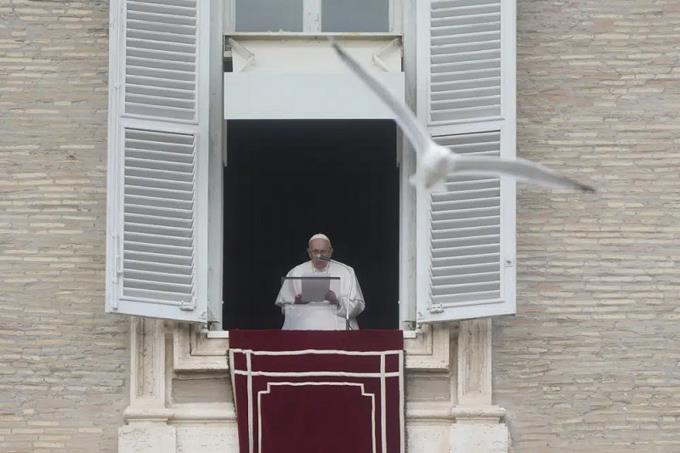Pope Francis broke his silence on Monday about the protests that have convulsed Iran and condemned the use of the death penalty in the country, in statements that seemed to legitimize the marches as demonstrations that “demand more respect for the dignity of women.” .
Francis made his remarks in an annual address to ambassadors accredited to the Vatican, a foreign policy address that details the issues of greatest concern to the Holy See.
In his remarks, Francis linked the Vatican’s opposition to abortion with its opposition to capital punishment, saying both were a violation of the fundamental right to life.
Francis has changed the Church’s doctrine on the death penalty, which he has designated as “inadmissible” in all circumstances.
“The right to life is also threatened in those places where the death penalty continues to be imposed, as is the case in Iran these days, after the recent demonstrations that demanded more respect for the dignity of women,” Francis said. “The death penalty cannot be used for a supposed justice of the state, since it does not represent a deterrent or render justice to the victims, but only feeds the thirst for revenge.”
They were the first public statements by the pontiff about the protests that broke out in Iran in mid-September over the death of Mahsa Amini. The 22-year-old woman died after being arrested by Iranian morality police for allegedly breaking the Islamic republic’s strict dress code. Women have played a prominent role in the protests, with many removing the mandatory Islamic headscarf, known as the hijab.
At least four people have been executed since the start of the protests, following snap trials behind closed doors that drew international criticism.
At least 519 people have been killed in protests in recent months and more than 19,200 have been detained, according to Iran Human Rights Activists, a group that has monitored the protests since their start. The marches have become one of the biggest challenges to Iran’s Shiite theocracy since its 1979 Islamic Revolution.
Francis has been careful not to directly criticize the Iranian government, given its efforts to foster dialogue with the Islamic world. Francis has developed a strong relationship with the imam of Al-Azhar in Cairo, a seat of Sunni learning. His efforts to engage in dialogue with the Sunni world have been more cautious, though in 2021 he held a historic meeting with the highest ranking Shiite cleric in Iraq, Iranian-born Grand Ayatollah Ali al-Sistani.
There was no immediate reaction to Francis’ words, although Iran’s Supreme Leader Ayatollah Ali Khamenei called in Tehran on Monday for a “firm” reaction to the demonstrations. Those who set fires in public spaces have committed “undoubtedly affirmed treason”, a crime that carries the death penalty in the country. He also reiterated evidence that foreign powers prompted the riots, without presenting supporting evidence.
Khamenei’s statements could reaffirm the authorities so that they continue with the harsh punishments on the detainees.
Francis referred to the Iranian protests by lamenting in general that in many parts of the world women are treated as “second class citizens.”
“They are subjected to violence and abuse and denied the chance to study, work, use their talents, and have access to healthcare and even food,” he said. Although Francis has appointed women to various senior Vatican posts, some women say they are also treated as second-class citizens by the Catholic Church because they cannot be ordained as priests.
Francis also referred to Iran in comments about the continued threat posed by nuclear weapons in Russia’s war in Ukraine, as well as the breakdown of negotiations over Iran’s nuclear program. Francis has changed the position of the Church to declare that not only the use, but the mere possession of nuclear weapons is immoral.
The paralysis in negotiations with Iran is a matter of “particular concern,” he said.
“It is my hope that a concrete solution can be reached as quickly as possible, for the sake of ensuring a more secure future,” the pontiff said.
Iran insists its nuclear program is peaceful, though it now enriches uranium to a concentration closer to weapons-grade levels and has severely limited international oversight of its nuclear activity in recent years following the collapse of its nuclear deal with international powers. .
In his comments, Francisco listed conflicts, natural disasters and migration crises that preceded the planet, but also threats to democracy, especially in America.
In a last-minute change in his speech, he added the “events of the last few hours in Brazil”, alluding to the thousands of decision-makers by former President Jair Bolsonaro who raided Congress, the Supreme Court and the presidential palace, and later caused destruction in the main seats of government.
“In many places, an indication of the weakness of democracy is the increase in political and social polarization, which does not help to solve the urgent problems of citizens,” he said. “I am thinking of the various countries in the Americas where political crises are marked by tensions and forms of violence that aggravate social conflicts.”
In addition to Brazil, he mentioned Peru and Haiti and said that “there is a constant need to overcome partisan ways of thinking and work for the promotion of the common good.”
